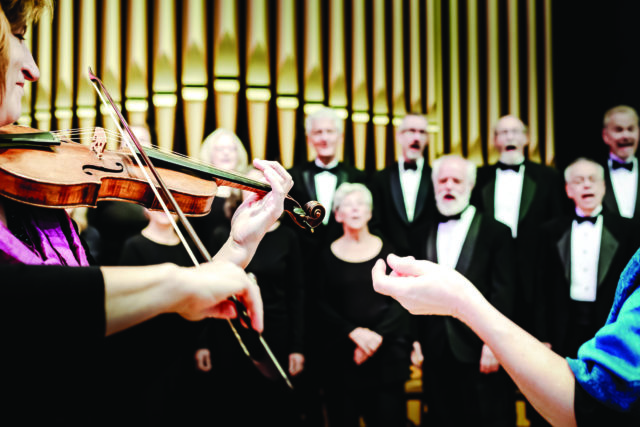
When Amanda Balestrieri says “see you in court,” it’s an offer, not a threat.
As director of Seicento Baroque Ensemble, she knows just how much music originated in the royal courts of the 17th and 18th centuries. And for the group’s final concert of the 2018–19 season, she is pulling music from the courts of England, France and other European countries into a single program. “In Your Court: A Royal Tour” will be performed March 22-24 in Boulder, Denver and Longmont.
In addition to the singers of Seicento, the concert features guest vocal soloists and local freelance instrumentalists who make up a small orchestra. The vocalists are students or recent graduates who wanted more experience with the Baroque style.
The topic of music from the royal courts was selected in advance, before Seicento even knew who their director would be for this year. It was intentionally open-ended, so when Balestrieri sat down to build the program she had a lot of leeway. “My first thought was to have the sense of the pomp and circumstance” in the courts, she says. “The second thought was to have pieces that specifically reference monarchs or were written by them.”
Portions of the program directly reflect this. The first set is titled “Pomp and Circumstance” and features a triumphal march from the French court by Marc-Antoine Charpentier, as well as pieces by Henry Purcell and William Byrd written for the English court of their times. There is also a piece by Dom Jão (King John) IV of Portugal, and a piece written in praise of Poland’s Prince Władislaw on the occasion of a visit to the Medici court in Florence, Italy.
There are other musical topics in the program, including sets of pieces titled “Sacred Music for the French Court,” “A Royal View of Rural Life” and “Reflections on Death.” The last is followed by the one Russian piece on the program, an Easter Canon by Nikolay Diletsky, representing resurrection.
Almost every piece, in some way, reflects on the relationship between the composer and his patrons, or life at court more generally. Part of the opening set is a piece by Purcell, “Welcome Vicegerent of the Mighty King,” which, Balestrieri says, “was written for the return of Charles II to London — to lick his boots, basically.” In an extreme way, that symbolizes the relationship between royal patrons and musicians in the Baroque era.
“These high-flown praises were written because they had to be,” she says. “The music was funded by people who had power and money. [Charles II] was the holder of the purse strings, as well as the monarch who could slap you in jail, yet we have absolutely drop-dead gorgeous music that we would not want to be without.”
Another example of over-the-top praise is the prologue to an opera by Francesca Caccini, one of the few active women composers of the era. The opera was written for Prince Władislaw’s visit to the Medici Court. Seicento will only perform the prologue, which features extravagant compliments for the visitor.
A different kind of relationship between patron and musician is suggested in “O Lord, Make Thy Servant Elizabeth our Queen” by William Byrd, written for Elizabeth I of England. The music is filled with dissonances and harsh clashes between voices, particularly in the words “her” in the phrase “give her her heart’s desire.” Those dissonances, Balestrieri says, may refer to the fact that Byrd, a devout Catholic, was not comfortable in Elizabeth’s Protestant court.
“We don’t know for sure, but within the community of people who sing this music, there is a feeling that the way it’s set and where the clashes occur indicates that there is [a hidden meaning],” Balestrieri says. “When you listen to it and you know what the words are, those clashes don’t entirely make sense.”
With so much music composed to send a message to monarchs and courtiers, Balestrieri treasurers a movement from Johann Kaspar Kerll’s Mass for the Dead. “One of the things I love about the Kerll [piece] is that he remarked that he wrote this for the peace of his own soul, which I thought was touching because it shows you this wasn’t just written to welcome the king back,” she says.
Similar layers of meaning — directed at the monarch or the courtiers, who were the only people who would have heard most of the music on the concert, since it was not performed publicly — can be found in every piece. All of that information is covered in Balestrieri’s extensive notes that will be printed in the program — information she is happy to share with Seicento’s audience.
In other words, she extends an invitation, not a summons: Come see us in court!
ON THE BILL: In Your Court: A Royal Tour — Seicento Baroque Ensemble, Amanda Balestrieri, conductor; with guest soloists and instrumentalists. 7:30 p.m. Friday, March 22, First United Methodist Church, Boulder. 7:30 p.m. Saturday, March 23, Julian Pavilion, Highland Center, 2945 Julian St., Denver. 2:30 p.m. Sunday, March 24, Stewart Auditorium,400 Quail Road, Longmont.
Tickets: 720-772-1610 or seicentobaroque.org/currentseason














